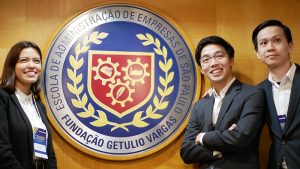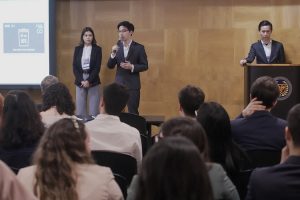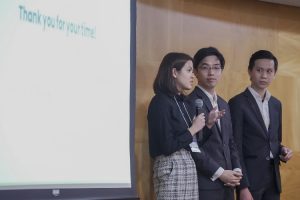Nearly 30% of the global population faces moderate food insecurity. Yet, an estimated 1.4 billion tonnes of food loss and waste were produced worldwide in 2020; this could have fed up to 2 billion people (25% of the world’s population). Challenges to maintaining food security are increasing due to supply chain, climate, and political issues. To address this, governments must implement effective food waste reduction strategies. Food Rescue is a multi-purpose mobile app designed to tackle three key obstacles that hinder food waste reduction: lack of data, awareness, and capability. Operated by the Singapore government, it connects consumers and businesses in public-private collaboration, educating and incentivising both parties to reduce their food waste. The app’s primary function is to collect standardised food waste data from participating businesses. On Food Rescue, companies can engage consumers in food waste reduction initiatives, such as listing surplus or imperfect foods at a discount for profit. Importantly, businesses promote and differentiate themselves through their food waste responsibility. Consumers can view this data to inform their purchases. Users can also access an educational toolkit for waste reduction and ongoing community initiatives. Food Rescue allows the government to directly reach a wide audience and pilot data collection methods. This model targets structural-level changes to substantially reduce food waste by providing critical data and public access that current solutions lack. In the long term, Food Rescue opens a path toward implementing a mandatory food waste reporting policy for businesses, extending its impact on waste reduction. Food Rescue in Singapore is a model for international application. This solution has the potential to contribute significantly to SDG 12.3. In the broader context, it also provides a harmonising bridge for divided parties to collaborate on a universal goal.

Members
Raphael Cheung Yiu Kwan is currently completing his Master of Public Policy at GraSPP. He is from Singapore and graduated summa cum laude with a double degree in Business Management and Accountancy from Singapore Management University. Prior to graduate school, Raphael spent a decade of professional life in a mix of the public sector, private sector, and nonprofit organisations. His roles span across internationalisation of businesses, business and corporate development, and organizational education. He hopes that by applying his varied experiences, he can contribute to solving global challenges.
Sky Chua Jun Jie is currently completing his Master of Public Policy (Economics and Development) and Master of Public Policy, International Program (Economic Policy, Finance and Development) as part of the GPPN Dual-Degree Program between the Lee Kuan Yew School of Public Policy (LKYSPP) at the National University of Singapore and GraSPP at the University of Tokyo. He is from Singapore. After graduating with a First Class Honours for his Bachelor of Science degree in Economics and Politics from the University of London, he worked as a Research Assistant at the Asia Competitiveness Institute where he served as the leading coordinator for the flagship Cost of Living project. His research interest includes Public Policy, International Political Economy, Macroeconomics, Monetary Economics, Developmental Economics & Socioeconomics Studies.
Shana Mitsui is pursuing a Master of Public Policy at GraSPP. She is from Japan and the US and obtained a BA from Tufts University, where she focused on transnational migration and human rights. Shana has worked on various human rights projects in the US, Denmark, and Bosnia and Herzegovina, which sparked her interest in social policy. Before her master’s, she spent four years in New Zealand working for a university. Outside of academics, she enjoys pottery, cooking, and exploring new places.
Emily Murnane is a first-year MPP/IP student at GraSPP. She is 22 years old and is of English and Japanese descent. Before coming to Tokyo, she studied an undergraduate degree in Geoscience at the University of Nottingham UK, where she focused on climate change research.
Priscilla Yip is a first-year MPP/IP student at GraSPP. She is from Singapore and holds a BSc Mathematics degree from Imperial College London in the UK. Priscilla specialised in applied mathematics and mathematical physics and hopes to use her STEM research skills to better inform policy-making. Her diverse skill sets have helped her to value add in previous internships with the Singapore Government in the fields of education, urban planning and smart nation.
Student reports
 At the GPPN Conference, I captured the diversity of ideas that ambitiously attempt to solve global problems across interdisciplinary fields. In the vast areas that were beyond my own expertise, it was an eye-opening exposure.
At the GPPN Conference, I captured the diversity of ideas that ambitiously attempt to solve global problems across interdisciplinary fields. In the vast areas that were beyond my own expertise, it was an eye-opening exposure.
Through the variety of projects that were presented, I also saw the potential of using applied public policy solutions in creative ways. Through discourse, many of them were sharpened for international scalability and practical application.
Looking back at the conference, I appreciate how it pushed me to ensure our ideas were practical and feasibly implemented, while also retaining cutting-edge effectiveness to address the problem(s) at hand.
It has been a fruitful conference learning from my fellow attendees. The many lessons have given me many insights and are real-world examples of the global issues that we research. My hope is that they will enable me to be a more sensitive and global-minded public policy professional.
Written by Raphael Cheung Yiu Kwan, 1st year MPP/IP

Participating in the GPPN conference was a unique and enlightening experience. The conference pushed us to approach complex issues from a variety of angles and understand the social, economic, and political implications of our proposals. The time constraints also allowed us to hone in on the critical aspects of our plan, and learn to present in a succinct and compelling way. Learning about a variety of under-reported issues was the highlight of the conference, giving us insights into the myriad of challenges governments face at the local, national, and international levels. This conference was overall a great practical experience in which we were able to analyse, critically think about, and present a real-world issue. These skills will be helpful for future assignments and research, as it encourages me to analyse feasibility, context, and contingencies, among others. Thank you so much for this opportunity, and to U Tokyo for supporting this endeavor! I also want to thank Ms. Aoi Ohno for all her hard work in making this happen for us:)
Written by Shana Mitsui Sayaka, 1st year MPP/IP

